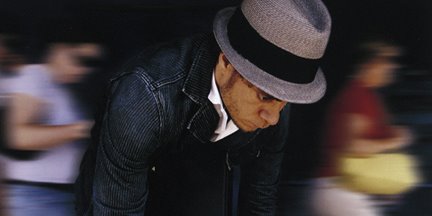
“Shout Out Loud”
from the album Supply and Demand
2006
iTunes
There are people who could go on about Amos Lee. Amos Lee isn’t one of them.
A folk troubadour who at 29 has already shared bills with Bob Dylan, Van Morrison, Paul Simon and John Prine, Lee would rather go on about other people.
“The cool thing about being a songwriter, or a writer, I guess, in general, you can take on a lot of different things, experience a lot of different things, just by writing about them,” he said, lightly plucking the guitar in his lap.
Lee, whose second album, Supply and Demand, is out this week, sat one afternoon at the Rockwood Music Hall, a cozy club on the Lower East Side of Manhattan where he sometimes plays unannounced. With brown shaggy curls, a pair of worn jeans, a pinstripe denim blazer and a button-down shirt that could have been from a thrift store or Barneys, Lee has a flair without looking as if he tries too hard.
When his demo made it into the hands of Blue Note record label executives, Norah Jones — who happened to be in the office — took an interest and hired him for her tour. His eponymous 2005 debut album drew critical praise and sold nearly half a million copies. Not bad for an ex-elementary schoolteacher from Philadelphia.
“I think in the pop world that stuff happens all the time,” said Rita Houston, music director of WFUV-FM, a radio station in New York among the first to promote Lee. “Not to say that his music can’t go pop, but when there’s an artist in the adult rock world, that’s pretty unusual for a debut.”
Asked if he were living a charmed life, Lee mumbled that he was just happy to play his music. In a world of ready-made idols, he seems gracious. Except for personal questions, which he answered politely but without detail.
Lee is single, partly a factor of life on the road. “It’s not as much being in a relationship, it’s developing a relationship that’s difficult,” he said. Still, he conceded, “If the right thing came along, it would be all good for me.”
Questioned about his childhood, he looked up and read his answer in the rafters. “I just appreciate everything that I’ve been given by my family,” he said. “Across the board, from my mother to my father to my aunts and uncles, everybody has always given me a lot of love.” He shrugged. “I feel blessed.”
Lee grew up in tough neighborhoods in Kensington and South Philadelphia, an only child whose cousins were more like brothers. A high school basketball player, he was a 6-foot-2 guard who had to face up to the fact that he couldn’t dunk. He went to the University of South Carolina, dropped basketball and focused instead on English literature.
The guys he fell in with played guitar, and Lee wanted in. So his stepfather gave him a guitar. Lee took a few lessons, learned the major chords and steeped himself in music. “I was just writing songs and studying,” Lee said. “I wasn’t running around and cavorting.”
As a record store clerk, he fell in love with Donny Hathaway, Monk and Coltrane. He surprised his family with his guitar and vocal skills; they were shocked that he wrote his own songs. Lee said he never sang in front of anyone until he was a senior in college. Not even in the car with friends, windows down, radio blaring.
His songs, Lee said, are mostly about other people’s experiences. In the anthemic “Freedom” from his new album, he sings “Freedom is seldom found by beatin’ someone to the ground.” His inspiration was a fistfight between two of his students, but the song could just as easily be about Iraq, Rodney King or civil rights.
In “Careless,” another song on the album, he sings about a man betrayed by a friend who sleeps with his lover. The last line, “How could you be so careless with her heart,” leaves a lingering question about compassion. Like his idols, John Prine and Bill Withers, he is intrigued by what he hasn’t experienced firsthand. “I’d like to operate from the outside, because I don’t find my story nearly as interesting as everybody else’s,” he said.
Lee weeded through nearly 50 new songs for his new album. Promoting his first album, he logged countless miles on the road. He is likely to do the same with his sophomore effort.
As for the students Lee left behind after two years’ teaching in Philadelphia public schools (sometimes as a substitute), he figures they all got the best deal. “I left because I wasn’t doing a good job,” he said. “I didn’t feel like I was doing the kind of work that I could put my heart into.”
Lee’s fall tour will take him through December. “I love what I do, so I don’t mind working,” he said. “I’ll work as much as I have to, ’cause it’s a labor of love for me.”
Just don’t call him the male Norah Jones. He’s Amos Lee.
